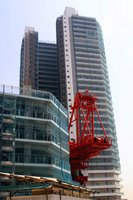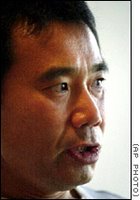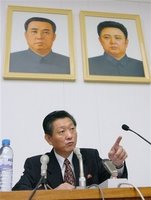Saturday, December 30, 2006
De eerste dame blogt
In ieder geval, de nieuwsgierigen die graag een glimp van premier Shinzo Abe’s kerstfeest opvangen, kunnen naar de blog 'Akie Abe's Smile Talk' surfen. Akie is de 44-jarige vrouw van de premier. In de laatste blogberichtjes kunnen we onder meer de kerstbol bewonderen die Akie van Laura Bush heeft gekregen; of ook nog hun kerstmaaltijd bij vrienden.
Akie Abe is een maand geleden met haar sympathiek blogje begonnen. Haar man kan de extra blogaandacht zeker gebruiken want de populariteit van de premier is de laatste tijd fel gezakt.
Akie Abe’s Smile Talk Blog:
http://www.abe-akie.jp/
(Origineel: in De Standaard expat-blog gepost)
'Japan is not lovable, but it's supremely interesting'
'People say, "When did you fall in love with Japan?" I never did; Japan is not lovable, but it's supremely interesting. I put a great prestige on learning, and in Japan you learn something new every day.'
Donald Richie. A lifetime’s observations (JT – 2006/12/28)
I cannot agree more. I live only in Japan since 1997. Donald Richie is 82 years old, almost 60 years in Japan. If he says it, I can be assured that it is impossible to get bored in this country. Everyday something new to learn.
De wereld feest
4 executies
Audiobestand: via de website van VRT Nieuws of Klik hier (mp3 - 870kb)
Sunday, December 24, 2006
Mt. Fuji from plane



And again Mt. Fuji from when returning back to Tokyo, Friday:

More pictures Kumamoto trip
Sunday, December 17, 2006
Japan stemt voor meer patriottisme
Nieuws 12u, 13u: audiobestand (295kb - mp3)
Lopende Zaken: audiobestand (1195kb – mp3)
Monday, December 11, 2006
Wereldnet 11 december
Ik heb iets verteld over 1) het Parijs-syndroom (パリ症候群), 2) diefstal van metalen spullen, 3) de blog van een maiko.
Audiobestand: via de Wereldnet-site.
Ijime
Audiobestand: Klik hier (mp3 - 1411kb)
Friday, December 08, 2006
Herfstkleuren



Thursday, December 07, 2006
An American visit to Japan, 1923
"This is the diary kept by my grandfather on his visit to Japan from August 6 to September 10, 1923, an idyllic travelogue culminating in the cataclysmic Tokyo Earthquake and Fire. Aside from a few commas, this transcript is verbatim":
An American visit to Japan, 1923
Maiko Blog
Hits keep coming for Web-savvy 'maiko' (IHT/Asahi)
Ichimame's blog is at http://ichi.dreamblog.jp/
Wellbeing Index
Young Indians happiest, Japanese most miserable (Reuters)
Tuesday, November 14, 2006
Monday, November 13, 2006
Launch PS3
Tuesday, November 07, 2006
Learning Japanese
Watch for example how clearly they explain the recent curriculum scandal:
Or watch this about the correct use of keigo (敬語):
Part1:
Part 2:
Wereldnet 31 oktober
Ik heb iets verteld over de herfst in Japan en toerisme.
Audiobestand via de Wereldnetsite.
Thursday, November 02, 2006
Thursday, October 26, 2006
Saturday, October 14, 2006
Tuesday, October 10, 2006
Noordkoreaanse kernproef
Audiobestand: Klik hier (mp3 - 480kb)
Saturday, September 30, 2006
Japan Ichiban
"In his conclusion, Abe called for people to maintain Japanese traditional virtues by quoting the famous physicist Albert Einstein: "I wish they don't forget to keep those treasures pure which they have in excellence over the west: their artistic building of life, the simplicity and modesty in personal need, and the pureness and calmness of Japanese soul."
Abe uses inaugural policy speech to call for flexing of Japan's military muscle (Mainichi - 2006/9/29)
Wednesday, September 27, 2006
Nieuwe regering
Tuesday, September 26, 2006
Wereldnet 25 september
Voor Japan heb ik gesproken over: 1. De vereniging van chauvinistische mannen; 2. De strijd tegen dronken rijden in Japan.
Audiobestand via de Wereldnetsite (of download hier – 5285kb)
Sunday, September 24, 2006
Wa
"In Japan, the wa surrounds you. You can feel it in the priciest sushi bars and lowliest noodle parlors. Call it the particular Japanese way of looking at the world; of harmony, of collectiveness with a do-not-rock-the-boat spirit. In the mythology of "Star Wars" movies, the wa is like the Force. To mess with the wa is a cardinal sin.
Junichiro Koizumi messed with the wa. (…) But most Japanese discovered a shocking truth: Maybe the wa needed to be messed with."
Exit Koizumi, Japan's Relentless Jedi Knight (Washington Post - 2006/9/23)
Thursday, September 21, 2006
Radio-interviews over Koizumi, Abe
Terugblik op het Koizumi-bewind (mp3 - 1070kb)
De verkiezing van Shinzo Abe (mp3 - 1244kb)
Luister ook naar de analyse van Prof. Dimitri Vanoverbeke van de KUL in 'De Wandelgangen' en 'Lopende Zaken':
Waarom stopt Koizumi ermee (mp3 - 1381kb)
Wie is Shinzo Abe (mp3 – 834kb)
Friday, September 08, 2006
Old & New


Flickr set : 20 foto's
Thursday, September 07, 2006
Prinselijke geboorte
Audiobestand (mp3 – 1005kb).
Wednesday, August 30, 2006
Nationalist Tide
Kato said Japan had lost its moorings and that individuals, disconnected from traditional family, work and community anchors, were floating like helium balloons on air currents.
"Even in the slightest breeze they will all start floating in the same direction," the one-time prime ministerial candidate said.
"And if there is a nationalistic mood that takes over the country, all of these balloons will begin to drift in a very strong way along this current."
Right-wing nationalist tide threatens Japan, warns political veteran (The Age 2006/08/29)
Thursday, August 24, 2006
Wereldnet 23 augustus
Voor Japan heb ik gesproken over: 1. Obon-verlofperiode; 2. Het Japanse kroonprinsenkoppel in Apeldoorn; 3. Overstromingen en tyfoons; 4. Het populaire baseballtornooi tussen middelbare scholen
Audiobestand via de Wereldnetsite (of download hier – 9376kb)
Elderly Foreigners
"Terri Nii, who has lived in Japan for more than 20 years and speaks fluent Japanese, is far from being dependent on her Japanese husband. But the 49-year-old resident in Fujisawa, Kanagawa Prefecture, is concerned what her life in Japan will look like in another 20 years.
She fears that the Japanese government may single out foreigners as the first target when it reduces medical outlays, nursing-care benefits and pension payouts.
Japan is expected to become unable to maintain the same level of social security benefits because of its aging population and declining birthrate, unless it slashes expenditures and raises taxes.
Nii, a California native, is arguably one of the most visible foreign residents in Kanagawa Prefecture. She runs a company in Fujisawa and sits on advisory panels to the municipal and prefectural governments.
But she said foreign nationals are in a sense invisible in Japan, where they are not granted what she calls regular status.
One reason is that foreigners are not covered by the resident registration systems, managed by local governments.
"I am a producing, tax-paying citizen in Japan, but I am not considered an official resident," said Nii. "I am uneasy about my status in the future when I may need to receive benefits rather than pay into the system."
Growing Old in Japan: Future care (Asahi – 2006/08/12)
Thursday, August 10, 2006
Lovely Voices
"When I made a complaint call once, the operator dealt with it very kindly, so I wanted to hear these women's voices," the daily Mainichi Shimbun quoted him as telling police in Hiroshima, western Japan.
Japan man makes 37,760 calls to 'kind' operators (Reuters – 2006/10/06)
Local Tokyo Shopping Street: Past and Present
"In 1983, I conducted a survey of all of the goods and services offered on the kilometer-long shotengai (shopping street) running from the station up to the turnoff to our little flat (...)": See article (JT - 2006/7/30)
"Now I have gone back to resurvey the shotengai, to find out how a Tokyo neighborhood has changed over the course of a generation": See article (JT - 2006/8/06)
Wednesday, August 09, 2006
The Japanese should worry about Yasukuni 'in defense of their own freedoms'
(See: Japan’s Aso wants state to run Yasukuni war shrine – Reuters 2006/8/08).
In my humble opinion Aso’s proposal is totally useless. First of all, I’m not sure that a state-run Yasukuni state-run would be a good idea as it will remember some of the wartime policies when Yasukuni was used by the government as a political tool to indoctrinate the population.
But more importantly, even if the 14 Class-A war criminals are removed the controversy around Yasukuni will not end for reasons Ian Buruma explained very well in an opinion article several months ago:
"To focus only on the Class-A war criminals is to ignore the essence of the shrine. Koizumi's claim that Japan is now a peaceful nation with no military designs on its neighbors may be true, but it is beside the point. And he is either ignorant or dishonest when he claims that visiting the shrine is simply 'a matter of the heart.'I think that the only solution will be to create of a new secular state war memorial totally separated form Yasukuni symbolism.
For Yasukuni Shrine is in fact a deeply political institution, established in 1869 to remember the men who died for the emperor. Japan did have an ideology that glorified militarism, racial superiority, and emperor worship. Going to war to bring Asia under the roof of the divine emperor was promoted as a sacred mission. Dying for the emperor was propagated as the highest virtue. That is why soldiers believed that they would meet after death at Yasukuni Shrine.
The glorification of militarism was not unusual at that time. Most European countries did the same, at least until the end of World War I. The association of monarchs with military glory was not unusual either. What made Japan unique was that this association became both a state religion and a political ideology, of which Yasukuni Shrine is the prime symbol.
The Japanese should care more about this, not because of Chinese or Korean protests, but because it did such harm to Japan itself.
For the blend of religion and ideology represented by State Shinto and emperor worship not only justified military aggression in Asia but also destroyed every attempt by the Japanese to establish a liberal democracy at home.
It deprived the Japanese population of the right to free speech. It demanded blind obedience of the Japanese armed forces to the emperor, and not to elected civilian governments. It led Japan into a brutal war, and it wrecked any chance for Japanese civilians to stop it.
Walking around Yasukuni Shrine today, you get the impression that none of this ever happened. Instead, a visitor to the museum is subjected to the same old excuses used by the military leaders of wartime Japan: Japan was forced into a war by foreign powers; Japanese soldiers fought bravely for freedom in Asia and peace in the world; their sacrifice should be a shining example to future generations, who owe their prosperity to these selfless martyrs of the imperial cause.
This is what makes the shrine such a disturbing place. Not the Class-A war criminals, but this destructive ideology, which has survived intact, despite war crime trials, democratic government, and more than half a century to analyze, debate, and reflect on the catastrophes of the past.
Japan is a free country, of course, and if people want to continue believing in emperor worship and wartime propaganda, they should be allowed to do so.
But if the prime minister himself insists on paying his respects at a place that represents these views, then it is not only other Asians that should worry about whether the Japanese have learned the lessons of the past. The Japanese should worry about it too, not to appease foreign critics, but in defense of their own freedoms."
Ian Buruma: The Yasukuni Problem (Kyodo News- 2006/1/30)
Saturday, July 29, 2006
Japan scoring low on the list of happiness
"If it is happiness you are seeking a move to Denmark could be in order, according to the first scientist to make a world map of happiness. Adrian White from the University of Leicester in the UK used the responses of 80,000 people worldwide to map out subjective wellbeing.Denmark 'happiest place on earth' (BBC News – 2006/7/28)
A nation's level of happiness was most closely associated with health levels. Wealth and education were the next strongest determinants of national happiness.
Denmark came top, followed closely by Switzerland and Austria. The UK ranked 41st. Zimbabwe and Burundi came bottom. Mr. White said he was surprised to see countries in Asia scoring so low, with China 82nd, Japan 90th and India 125th" (...)

Happiness Map (pdf - 146 kb)
Friday, July 21, 2006
Working but poor
"In Japan the poverty rate is higher for single-parent families that work than for those that do not work," said OCDE’s senior economist Randall Jones. "In Germany the solution is, get those single families to work and then they escape poverty. In Japan they're already working. The problem is the income is too low. So there's not the easy solution to say 'let's just find them jobs'."
OECD Concerned About Rising Poverty in Japan (VOA – 2006/7/20)
Thursday, July 20, 2006
Widening income gap
Hopefully PM Koizumi will take a good look at the statistics the OCDE published today:
Japan ranked second worst among advanced economies in 2000 in terms of the relative poverty rate partly because non-regular workers with low wages increased amid the prolonged economic slump, the Organization for Economic Cooperation and Development said Thursday.
The proportion of the population living in relative poverty, defined as less than one-half of the median household disposable income, came to 13.5 percent in 2000, the second highest among OECD members following 13.7 percent in the United States, the OECD said in a survey on the Japanese economy.
Japan ranks 2nd worst among OECD nations in relative poverty (Kyodo – 2006/7/20)
Sunday, July 16, 2006
Don't get dumped by your wife
The group's main activity is regular get-togethers at local izakaya Japanese-style pubs. They discuss what their wives are like and how to deal with them depending on the situation.Husbands reform to keep from getting dumped (Asahi – 2006/7/15)
"For example, we've come up with a rule never to sit opposite your wife when she says, 'Could you please sit down. I have something to say to you,'" Amano says.
"In most cases, their eyes are too terrifying to face, and it's most likely things will start flying across the room at you."
Amano says the best thing to do on these occasions is to sit beside your wife, hold her hand until her anger passes, and then apologize profusely before she even brings up what you did wrong.
Tuesday, July 11, 2006
Interview Wereldnet - Portret
Audiobestand via de Wereldnetsite (of download hier - 16220kb)
Interview: N-Koreaanse dreiging
Gisterenavond kreeg ik een telefoontje van het nieuwsprogramma 'De Wandelgangen' van Radio 1 met de vraag hoe erg Japan zich zorgen maakt:
Audiobestand (mp3- 1020 kb - 4min 30sec)
Saturday, July 08, 2006
'Just watch and find out'
N. Korea warns of 'stronger' action (Asahi – 2006/7/08)A North Korean ambassador Friday blamed Japan for Pyongyang's missile launches and warned that any complaints from Tokyo would be met with "an even stronger physical response".
When reporters asked the ambassador if a "strong response" meant new missile launches or nuclear weapons development, he said, "Just watch and you will find out."
Rakettencrisis
Het was niet zo aangenaam om deze morgen op te de staan en onmiddellijk de crisissfeer aan te voelen tijdens het ochtendnieuws: 'Noord-Korea heeft drie raketten afgevuurd', hoorden we tijdens het nieuwsbulletin van 6h30. Daarna was er sprake van vier, vijf en uiteindelijk zes raketten. Alle raketten zijn tussen 3.30u en 8.30u afgevuurd en in de Japanse Zee beland.
Het nieuws was zo overweldigend dat de NHK, de openbare omroep, besliste dat het ochtendfeuilleton moest wijken voor de actualiteit. Hoogst ongebruikelijk in tv-amusementland Japan. Dit was niet meer gebeurd sinds de grote Hanshin-aardbeving van 1995.
Ervaring met dreigende Noord-Koreaanse raketten hebben we al. In 1998 heeft Noord-Korea een Taepodong 1 afgevuurd die over het Japanse grondgebied is gevlogen. Noord-Korea beweerde toen dat het om de 'lancering van een satelliet' ging.
Veilig voelen we ons allesbehalve om naast zo een grillig en onvoorspelbaar regime als Noord-Korea te moeten leven.
Noord-Korea ligt al een hele tijd in de clinch met Japan over diverse zaken, onder meer de trieste ontvoeringszaak die geen oplossing vindt. Maar de provocatie van vandaag moeten we plaatsen in het kader van het zeslandenoverleg over het Noord-Koreaanse kernprogramma. Dat overleg ligt al maanden in het slop. Het is aannemelijk dat de Noord-Koreaanse leider, Kim Jong-il, de Verenigde Staten onder druk wil zetten om het overleg weer op gang te trekken.
Japan heeft 'strenge tegenmaatregelen' beloofd. Zeker is dat de samenwerking tussen Japan en de VS nog verder zal toenemen: levering van Patriot-raketten, samenwerking voor de ontwikkeling van een rakettenschild…
Japan en de VS zullen alles doen om een brede internationale veroordeling te bekomen. Als er één ding is dat Noord-Korea vandaag bereikt heeft, dan is het om zichzelf nog verder te isoleren op het wereldtoneel.
In Japan zijn we er niet helemaal gerust in. We kunnen niet uitsluiten dat het Noord-Koreaanse regime de ene of de andere dag helemaal doorslaagt.
--
Oorsponkelijk gepost in de De Standaard Expatblog (2006/07/05)
Wednesday, July 05, 2006
Interview
Het interview met de correspondent in Washington en mezelf in Japan: Audiobestand (mp3 – 1.677kb)
N-Korea fires 6 missiles
Cooperation between Japan and the US will certainly intensify. Within hours (around 7am) the American ambassador in Japan had already talks with the foreign minister, Taro Aso, and Chief Cabinet Secretary, Shinzo Abe. Significant is that this meeting with the American ambassador took place even before Premier Koizumi started a security meeting with is top ministers.
N Korea tests long-range missile (BBC News - 2006/7/05)
Tuesday, July 04, 2006
Murakami worried about nationalism
 Novelist Haruki Murakami has attacked Japanese nationalism in an interview with an English-language newspaper based in Hong-Kong. He also revealed plans to deal with the issue in his next novel.
Novelist Haruki Murakami has attacked Japanese nationalism in an interview with an English-language newspaper based in Hong-Kong. He also revealed plans to deal with the issue in his next novel."I'm worried about my country," the author told the South China Morning Post. "I feel I have a responsibility as a novelist to do something."Murakami hits out at Japanese nationalism (The Guardian - 2006/7/04)
He singled out Shintaro Ishihara, the right-wing governor of Tokyo, for particular criticism, calling him "a very dangerous man" (...) "He's an agitator," Murakami reportedly said. "He hates China."
Saturday, July 01, 2006
Off-Topic: How to get music OFF your iPod
Via googling I found finally a neat little program to circumvent the iTunes limitations:
How to get music OFF your iPod (via Engadget)
Ridiculous
Of course, the man cannot take the risk to say the truth. Having to depict the horrible N-Korean regime as a rescuer is painfully ridiculous:
"Pyongyang has never admitted to kidnapping South Korean citizens. And Kim Young Nam could hardly say otherwise. His words were spoken inside North Korea under the watchful eyes of authorities. It would be unreasonable to expect Kim to be able to speak freely under such conditions(...)
Reading from what appeared to be a prepared script, Kim soundly condemned Japan's handling of the matter, echoing the official line spouted by Pyongyang(...)
Seoul has certified Kim Young Nam as an abduction victim. Former North Korean spies have testified that he was indeed abducted. Meeting the press, however, Kim denied he was abducted. He has since remarried, and has a son with his new wife. Under these circumstances, he obviously cannot afford to say much about how he arrived in North Korea."
Megumi’s Husband (Asahi – 2006/7/01)
Wednesday, June 28, 2006
Computer problems
Tuesday, June 27, 2006
Home Sweet Home
"Home is not sweet for the vast majority of Japanese couples, who feel exhausted and believe inconsiderate spouses are to blame, a survey has said (...)
Men say they are exhausted because they are nagged by their wives or asked to clean up, while women point to their husbands' uncooperative attitudes, the poll said(...)
So what's the solution? Forty-seven percent of men say they want their wives to tell them, "Take it easy," while 43 percent of the women want their husbands to offer to cook."
Most Japanese stressed out by spouses (AFP - 2006/6/26)
Worrying
"Throughout the entire U.S. State Department and the National Security Council, there is not currently a single Japan specialist in a position of significant authority"Broaden the U.S.-Japan alliance (IHT - 3006/6/27)
Monday, June 26, 2006
Supreme Court not fulfilling its role
"When Prime Minister Junichiro Koizumi visited Yasukuni Shrine, which honors Class-A war criminals alongside the nation's war dead, did he violate the constitutional separation of state and religion?(...)Koizumi visit to Yasukuni (Asahi - 2006/6/26)
On Friday, the top court sidestepped the issue altogether, rejecting the plaintiffs' claims without ruling on the visit's constitutionality.(...)
If the Supreme Court continues to avoid making judgment calls about the separation of religion and state--a major pillar of Japan's Constitution--then it is not fulfilling its role as 'guardian of the Constitution'."
Uniqueness
"We must not think that Japan is the only country with good qualities or believe that our 'unique culture' is better than others (...) There is no reason we should feel superior to others".This is such an evident truth that I'm amazed it is still necessary to publish something so basic in a big newspaper. But then, after all, maybe the writer is right to recall this evidence. He writes a little bit further:
"Some people are calling for the revival of so-called Japanese virtues. There are moves under way to introduce this idea in schools, and the Diet recently debated a revision to the Fundamental Law of Education. Such moves are aimed at strengthening moral education and promoting patriotism (...)
In my opinion the moves only encourage the view that Japan is somehow special. If the argument for patriotism is abused, it could lead the public toward the same nationalism we had in the prewar years."
Point of view: Japan is good enough to be an ordinary nation (Asahi - 2006/6/26)
Gadgets
Growing Gap
Japan is shifting from a society where the overwhelming majority of households once considered themselves middle class, to one in which clearly pronounced classes, including the very rich, the affluent, and those less fortunate -- such as temp-help staff who carry home 2 million yen a year -- are relegated to the bottom rungs (...)
Japan's goal of a nation in which nobody was really very rich or very poor proved to be unsustainable. "Freeters" -- male part-time service industry workers with no fringe benefits and little job security -- could earn enough to sustain their livelihood, but not enough to marry and raise a family. This suggests that society may soon find itself with a permanent underclass, unable to even afford a college education or other things that would give a foothold, however tenuous, on upward mobility."
Wealth, poverty and the shrinking middle class (Mainichi - 2006/6/25)
Saturday, June 24, 2006
'Wij zijn uniek, ook als we verliezen'
Omdat 'wij klein zijn en zij zo groot'. Rare theorie, merkt conbinibento terecht op:
One can often hear the “Japan-is-a-small-agricultural-country” mentioned as the reasoning behind just about any possible shortcoming of Japanese society. Soccer team isn’t doing well? “We are a nation of small farmers.” Defeated in WWII? “We are a peaceful farming nation.” Increasing crime and weakening social fabric? “Western influences are destroying our small, harmonious nation.” Am I exaggerating a bit? Yes, but I’m not pulling it out of my ass completely”.
Physically we are small (conbinibento.com – 2006/6/20)
Japundit voegt er een logische vraag aan toe om de nihonjinron-theorie definitief van tafel te vegen:
"I wonder if it ever once occurred to these people that the other countries might just have superior teams."
It’s how you play the game (Japundit – 2006/6/20)
Puzzling
"Given widespread indifference among the Japanese public about whaling and eating whale meat, why is the government pursuing such a confrontational foreign policy?"
Japan heats up whaling wars (JT - 2006/6/24)
Vleespotten in walviswereld
"In a written reply to a query on Japan's "marine aid" to developing countries, the government acknowledged pouring 617 million yen ($8.7 million) last year into St Kitts & Nevis, the tiny Caribbean nation that hosted the IWC conference.Scale of Japan's aid to pro-whaling nations revealed (nzherald - 2006/6/24)
Nicaragua, the top recipient of Tokyo's largesse, was awarded about $17 million, and the Pacific island cluster of Palau got $8.1 million. (...)"
Friday, June 23, 2006
'Stijve harken'
"Japan's Crown Prince Naruhito, Crown Princess Masako and their daughter, Princess Aiko, will vacation in the Netherlands in August in part to treat the crown princess' stress-induced illness, an Imperial Household Agency official said Friday.Ik ben niet zeker of Nederland een goede keuze is. Hadden ze niet kunnen kiezen voor Hawaï, de Côte d'Azur, de Seychellen of zoiets?
The trip, scheduled from mid- to late-August, will be the family's first overseas. No imperial family member has ever gone abroad for recuperation purposes."
Crown prince's family to vacation in the Netherlands (Kyodo - 2006/6/23)
Seksloze huwelijken
"A survey conducted last year of 936 people, aged 16 to 49, conducted by JFPA and Jichi Medical University in Tochigi Prefecture shows that 31 percent were "sexless" (...)Japan sagging in sex department, hence fewer kids: expert (Japan Times - 2006/6/22)
"Japanese people simply aren't having sex," said Kunio Kitamura, executive director of the Japan Family Planning Association Inc. adding that "as much as subsidies and welfare programs are important, sexlessness is also a critical issue in this problem" of the declining birthrate (...)
What stood out in the JFPA results was the lack of communication between the couples."
Thursday, June 22, 2006
Les goûts et les couleurs ne se discutent pas
Top 25 potential Japanese girlfriends (Japan Probe - 2006/6/22)
Wednesday, June 21, 2006
Te heet om te voetballen
Japanse voetballers kunnen niet tegen de hitte? Is dat een grap of wat? De zomermaanden in Japan zijn ongelofelijk heet en vochtig. Verstikkend, uitputtend, ondraaglijk. Niets liever zou ik doen dan de verzengende Japanse zomers om te te ruilen voor Europese zomers. Voor mij is het duidelijk dat het lichaam van de gemiddelde Japanner beter tegen de hitte kan dan het lichaam van de gemiddelde Noord-Europeaan. Japanners zweten minder, raken minder snel gedehydrateerd. Zelfs als het asfalt in de Tokiose straten bijna onder de voeten wegsmelt, zie je de salarymen nog lustig en probleemloos met zwart maatpak en strakke das door de stad snellen.
Meer nog, het Japanse voetbalseizoen overspant de volledige zomer, terwijl in Europa de hele winter wordt gespeeld. Als de zomerse hitte een factor is, dan zou het in het voordeel moeten spelen van de Japanse voetballers.
Na het verlies tegen Australië en de match zonder doelpunten tegen Kroatië, is het begrijpelijk dat de Zico onder druk staat. Japan moet donderdag (avondmatch ditmaal) met twee goals winnen tegen het machtige Brazilië om door te stoten naar de volgende ronde. Een onmogelijke taak, oordelen de realisten. Het objectief van de Japanse ploeg is niet meer om te winnen, maar wel om eervol te verliezen.
Zico hot under the collar as Japan exit looms (smh – 2006/6/20)
Taepodong 2
This issue concerns our autonomy. Nobody has a right to slander that right"Als een verongelijkt baasje zegt N-Korea dat de Taepodong hun ding is dat ze mogen afvuren waar en wanneer ze willen.
Volgens mij wil dit zeggen dat ze redelijk onder de indruk zijn van de wereldopinie en hun raket niet gaan durven afvuren. Het enige dat ze nog kunnen afvuren is straffe taal.
N Korea defies missile pressure (BBC News - 2006/6/20)
Tuesday, June 20, 2006
Rustpensioen?
Het hoeft dus niet te verwonderen dat in de Yomiuri te lezen stond dat man en vrouw het niet eens zijn hoe de oude dag door te brengen:
Men and women in their 50s in the Tokyo area differ markedly over how they would like to live following retirement, with a majority of men wishing to live in the countryside and a majority of women favoring a conveniently located condominium, according to a survey of married couples who are not living with their children.Tokyo couples divided over how to spend twilight years (Yomiuri 2006/6/19)
Sunday, June 18, 2006
Unharmonious Foreigners
"It all began in 2003 when a 6-year-old boy from Osaka was fatally crushed in one of Roppongi Hills' revolving doors. Three years on, one of the complex's most celebrated residents, Livedoor CEO Takafumi Horie, finds his IT company in shambles as he faces a litany of criminal charges. And earlier this month financier Yoshiaki Murakami, another denizen of Roppongi Hills, was arrested on suspicion of insider trading (…)
These front-page stories aside, Roppongi's cosmopolitan image seems to have attracted the wrong kinds of people (…)
The answer is bad fengshui (…)
The many shrines and temples in Monzencho -- as Roppongi was called in olden times -- were situated to ensure the proper flow of ki (spiritual energy), and with the kimon (devil's gates) aligned -- north, south, east and west -- so as to direct bad spirits from the area. But they were successively demolished to make way for new redevelopment projects that have upset the balance.
Foreigners worship their own countries' deities, so one might say the old spirits that protected Roppongi have lost their force. Then came redevelopment, which was aligned unfavorably, which also affects the corporations quartered in Roppongi Hills. All these corporate crimes are a result of the bad spirits that converged on the district."
Is Roppongi cursed? (Japan Times – 2006/06/18)
Saturday, June 17, 2006
Yamato Battleship
"I suspect we will not see this sake for sale outside of Japan" (Japundit - 2006/6/17)
Working less? It will not work
"Workers who put in more than 40 hours of overtime a month will earn the right to an extra day off the next month, according to a policy paper prepared by the Ministry of Health, Labour and Welfare (...)Japan tries to cut hours for overworked salarymen (Financial Times - 2006/6/17)
Sceptics wonder whether the government’s new ruse will work. This is the land of “service overtime” – unofficially working extra hours for free (...) The average worker in Japan uses less than half of his or her annual holiday and the rate is falling every year.This suggests two possible flaws with the new law, say cynics. The first is that most overtime is not officially recorded, so employees working too hard will not qualify for the extra time off.
The second is that if workers take less than half their usual holiday entitlement, they are even less likely to take the extra day they have earned through their labours. But “it’s difficult to make the extra holiday compulsory”, says a research officer at the ministry."
False alarm
"Police in southern Japan closed off roads, evacuated residents and even brought in a bomb squad after spotting a suspicious box in a police station (...)Japan bomb squad mobilized over six-pack (Reuters - 2006/6/17)
A bomb squad was rushed to the scene after an X-ray scan showed metallic cylinders inside the box. A local television station broadcast the incident live using helicopters(...)
But police found out the true contents after a woman, having seen the TV report, contacted them saying that she had left the cans of beer on Friday morning in return for receiving advice on home security."
